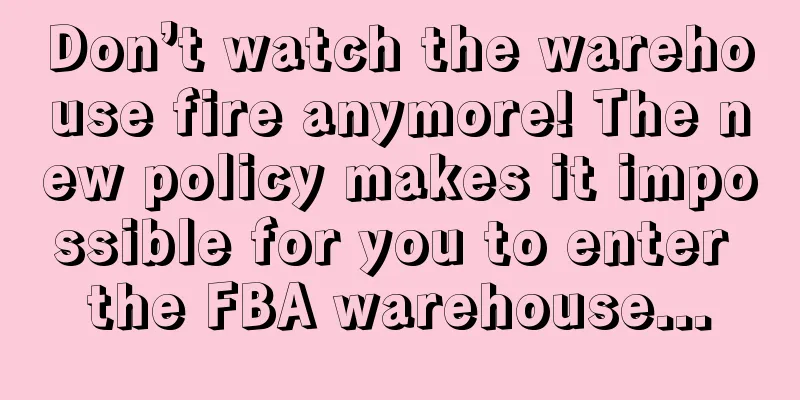Don’t watch the warehouse fire anymore! The new policy makes it impossible for you to enter the FBA warehouse...

|
I think everyone has been flooded with news about the fire at Amazon warehouse recently. A fire broke out at MEM1 warehouse on the 1st of July, and a large amount of goods were lost. Amazon also notified all sellers. All sellers involved in the warehouse fire, whether they have goods burned, or are preparing to ship or have already shipped to the warehouse, can find out how to deal with their goods in the notification, which is clearly arranged by Amazon. Although sellers are delighted when their unsaleable redundant inventory is burned, most of them may still have to bear some risk of out-of-stock. The time required to transfer goods in transit to other warehouses will be much longer. It is even more dangerous for sellers who have lost their products and need to replenish them as soon as possible. Now that the New Year is approaching, factories generally have to go on holiday early (some factories we cooperate with have even already gone on holiday), so the replenishment plan will have to be postponed until after the New Year. Of course, this is not our focus today. What I want to tell you is After the New Year, you replenish the goods in the FBA warehouse It may be rejected by the warehouse! As usual, let me show you the official notice first. FBA buyers who use manufacturer barcodes to label and track products must switch to Amazon barcodes after the 25th, otherwise they may be denied entry into the warehouse! Let me show you what this labeling method that is about to be banned is. When we prepare goods to be sent to the FBA warehouse, according to Amazon's regulations, they must have a traceable barcode, so sellers must label the goods before sending them out. We usually use ●UPC and EAN codes of eligible products
In addition to these three methods, there is also our protagonist today - the manufacturer barcode. In the official default background settings, the manufacturer barcode is used to track the product. Using manufacturer barcodes is a very convenient way for both Amazon and sellers, and all inventory tracked in this way is shared across the entire Amazon fulfillment network.
For example For example, a buyer purchases a product tracked by a manufacturer barcode in your store, but your inventory is in a warehouse far away from the delivery location. At this time, there is also a product with the same manufacturer barcode in a warehouse very close to the buyer's delivery location (which means it is the same product). At this time, Amazon will deliver the goods directly to the buyer nearby and replenish your inventory stored far away to the shipping warehouse, and you can still get the payment. This tracking method greatly improves the buyer's shopping experience, which is a good feature for both sellers and buyers, but the requirements are also very high. Not only that, Amazon will also review and determine on its own which products are eligible for manufacturer barcode tracking, and will review or even disqualify products that originally met the requirements but now do not. Although the conditions are harsh, they are convenient for buyers and sellers do not have to do the work of labeling. Manufacturer barcodes are usually available directly from the factory, while FNSKU and ASIN require sellers to repack and label after receiving the goods from the factory (except for the wealthy sellers who have their own factories). Therefore, there are still many sellers who use manufacturer labels, and it is these sellers who were affected this time. what to do? The goods already in the warehouse have nothing to do with the goods being shipped to the warehouse and will not be rejected by the warehouse. However, after January 25, if the goods sent to the warehouse only have the manufacturer barcode on them, they will be rejected by the Amazon fulfillment center, so they must be repacked and labeled (ASIN or FNSKU) before being sent out. For ASINs that already use manufacturer barcodes, you need to recreate the product to change to Amazon barcode (ASIN or FNSKU) tracking. If it is transferred from seller delivery to FBA, you can select the relevant option to change to Amazon barcode tracking during the conversion. And since the manufacturer barcode is no longer valid alone, it is better to change the default tracking mode to the Amazon barcode. The set path is as follows Please note that this default setting is only valid for newly created products. For existing products, you should use the above method to modify them individually. Therefore, when you create a new delivery plan after the 25th, you must pay attention to the labeling issue. Goods with only the manufacturer's barcode will be refused entry into the warehouse and will be returned! If you have any other questions about labeling, please scan the QR code and add my WeChat to ask me~ PS. If you want to join the seller discussion group, you can also private message me to let me add you to the group |
<<: Tax ID is not enough! Amazon Germany is closing stores again...
>>: Amazon is about to restrict this feature...
Recommend
What is Zhongheng Tianxia? Zhongheng Tianxia Review
Since its opening, the company has established str...
What is UXPAY? UXPAY Review
UseePay focuses on providing cross-border trade co...
What channels are available for purchasing Amazon's 1 million insurance?
Yesterday, I saw a message in my circle of friend...
Europe is going to give out money again! Will Amazon's commission increase?
Many sellers on the US site should still remember ...
The secrets of the US holiday season trend are revealed! More than 70% of people will shop on e-commerce platforms!
It is learned that in order to help sellers better...
Strengthening cooperation! Amazon AWS becomes Best Buy's strategic cloud provider!
<span data-shimo-docs="[[20,"获悉,据外媒报道,近日百思...
Back-to-school spending by U.S. parents will increase by 21.8% in 2024, with Walmart and other platforms being the top choices
It is learned that recently, according to the late...
Procurement Tips: How to deal with the supplier's minimum order quantity requirements?
Purchasing goods from suppliers is not as simple ...
What is CE certification? CE certification evaluation
CE is a safety certification mark and is regarded ...
Is it better to report more quantity on Amazon flash sales?
There are many factors that affect the flash sale....
What is Keepa plugin? Keepa plugin review
Amazon Price Tracker is an Amazon historical price...
What is MiJu Technology? MiJu Technology Review
Shenzhen Miju Technology Co., Ltd. was born in She...
What is Splitly? Splitly Review
Splitly is an Amazon operation tool developed by J...
Request reviews in batches in one second! 0-cost Amazon Review acquisition tool, free your hands and request reviews safely during the epidemic
Although the current global epidemic situation is ...
My humble opinion on the structure and division of labor of Amazon's cross-border e-commerce team
The structural division of labor of the cross-bord...









